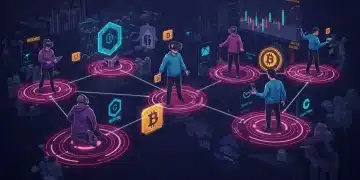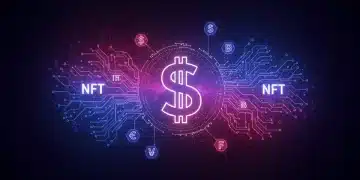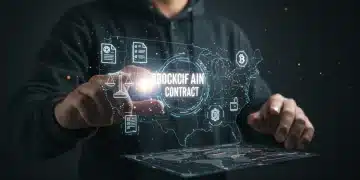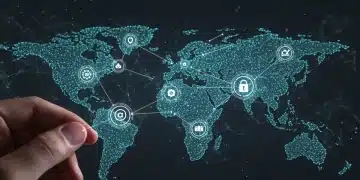The Future of Web3 Education: Skills for Success in the US

The future of Web3 education in the US emphasizes practical skills, accessible learning pathways, and community-driven knowledge sharing to empower individuals for success in the decentralized web.
The rise of Web3 presents both immense opportunities and a significant skills gap. To navigate this evolving landscape and thrive in the US Web3 sector, a new approach to education is essential.
The evolving landscape of Web3 and its demand for new skills
Web3 is rapidly transforming industries and creating new economic models. Understanding the core concepts and possessing the right skills are crucial for anyone looking to participate in this revolution.
Understanding the core concepts of Web3
Web3 is built on the principles of decentralization, blockchain technology, and user empowerment. It aims to create a more transparent, secure, and equitable internet.
The increasing demand for Web3 professionals in the US
With the growth of Web3 companies and projects across the US, there is a surge in demand for skilled professionals who can develop, implement, and manage Web3 technologies.
- Blockchain developers: Professionals capable of building and maintaining blockchain networks.
- Smart contract developers: Experts in creating and deploying self-executing contracts on the blockchain.
- Web3 UX/UI designers: Designers focused on creating user-friendly interfaces for decentralized applications.
- Community managers: Individuals responsible for building and engaging with Web3 communities.
Mastering these skills opens doors to exciting career opportunities in the US Web3 ecosystem. The demand for qualified professionals is only expected to grow.
Traditional education vs. Web3: Addressing the gap
Traditional education pathways often lag behind the rapidly evolving Web3 space. This gap necessitates alternative and more agile learning solutions to equip individuals with the required skills.

Limitations of traditional educational institutions
Traditional universities and colleges typically offer courses that are slow to adapt to the latest Web3 developments. This can leave students with outdated knowledge and skills.
The rise of online Web3 courses and bootcamps
Online courses and bootcamps provide flexible and intensive learning experiences that focus specifically on Web3 technologies. These programs are often designed to quickly equip individuals with in-demand skills.
Online Web3 courses and bootcamps are catering to the evolving demand for qualified professional in the space
Key Skills to Succeed in Web3
To thrive in the Web3 job market, individuals need a combination of technical, business, and soft skills. These skills enable them to effectively contribute to Web3 projects and organizations.
Technical skills: Blockchain development, smart contracts, and cryptography
A strong foundation in blockchain development, smart contracts, and cryptography is essential for those building Web3 applications. These areas include proficiency in programming languages like Solidity and Rust.
Business and economic acumen: Understanding tokenomics and decentralized finance (DeFi)
Knowledge of tokenomics and DeFi is crucial for navigating the economic aspects of Web3. This includes understanding how to design and manage token economies, as well as participating in DeFi protocols.
Soft skills: Communication, collaboration, and problem-solving
Effective communication, collaboration, and problem-solving skills are vital for working in Web3 teams. These skills enable individuals to effectively contribute to projects and navigate complex challenges.
- Communication: Clearly conveying technical concepts to a wider audience.
- Collaboration: Working effectively in distributed teams and open-source communities.
- Problem-solving: Addressing unique challenges in decentralized systems and blockchain technologies.
Developing these soft skills enhances one’s ability to contribute meaningfully to the Web3 ecosystem.
Top platforms and resources for Web3 education
Numerous platforms and resources are available to help individuals learn Web3 skills. These range from online courses to community-driven learning initiatives.
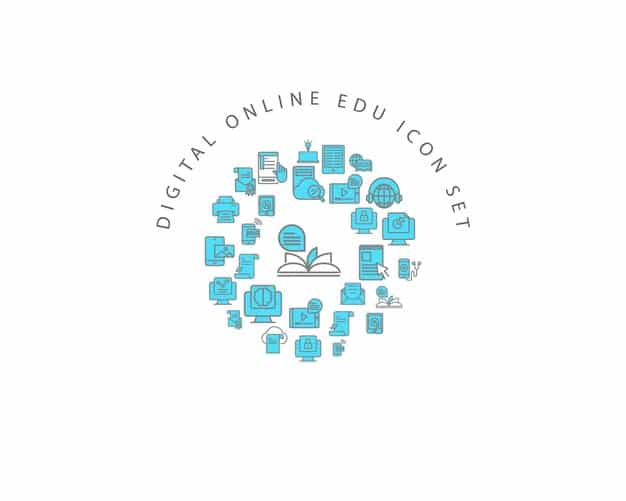
Online courses and learning platforms (Coursera, Udemy, etc.)
Platforms like Coursera and Udemy offer a wide range of Web3 courses taught by industry experts. These courses provide a structured learning path and often include hands-on projects.
Community-driven learning initiatives (DAOs, guilds, etc.)
Decentralized Autonomous Organizations (DAOs) and guilds provide community-driven learning opportunities. These initiatives foster collaboration, knowledge sharing, and mentorship within the Web3 space.
Community focused learning initiatives offer a different perspective when learning about the Web3 space.
The role of mentorship and community in Web3 learning
Mentorship and community play a critical role in Web3 learning. They provide guidance, support, and networking opportunities that are essential for navigating this rapidly evolving field.
Finding mentors and building a network in Web3
Connecting with experienced professionals in Web3 can provide invaluable mentorship and guidance. Building a strong network can also open doors to new opportunities and collaborations.
Participating in Web3 communities and events
Engaging in Web3 communities and attending industry events is a great way to learn from others, share knowledge, and stay up-to-date with the latest trends. These interactions foster a sense of belonging and collaboration.
Active participation in communities can speed up the learning process.
Future trends in Web3 education
The future of Web3 education will likely be shaped by emerging technologies and evolving industry needs. Understanding these trends is crucial for staying ahead in the Web3 space.
Personalized learning paths and AI-driven education
AI-driven education can provide personalized learning paths that adapt to individual needs and learning styles. This approach can optimize the learning experience and improve outcomes.
Integration of Web3 technologies in education (NFTs, decentralized credentials)
Web3 technologies such as NFTs and decentralized credentials can be used to create more secure and transparent educational systems. These innovations can transform how we track and verify learning achievements.
Web3 technologies offer a different perspective on verification of learning achievements
| Key Point | Brief Description |
|---|---|
| 💡 Core skills | Blockchain development, smart contracts, and cryptography are essential. |
| 💰 Tokenomics | Understanding token economics and DeFi is crucial for Web3 success. |
| 🤝 Community | Mentorship and community engagement are vital for learning and networking. |
| 🤖 AI | AI offers personalized learning paths for Web3 education. |
FAQ
▼
Web3 is the next phase of the internet, emphasizing decentralization, blockchain technology, and user empowerment. It’s important because it promises more transparency, security, and equitable access to digital resources.
▼
In-demand skills include blockchain development, smart contract programming, Web3 UX/UI design, and community management. Expertise in these areas opens doors to various opportunities in the Web3 sector.
▼
You can learn Web3 skills through online courses, bootcamps, community-driven initiatives, and hands-on projects. Platforms like Coursera, Udemy, and DAOs offer structured learning paths and collaborative environments.
▼
Mentorship in Web3 provides guidance, support, and networking opportunities. Experienced mentors can help navigate the complexities of the Web3 space and offer insights into career paths and emerging trends.
▼
AI can personalize learning paths, provide real-time feedback, and adapt to individual learning styles, enhancing the overall educational experience. AI driven education can also make Web3 education more accessible and efficient.
Conclusion
The future of Web3 education in the US lies in embracing agile learning solutions, focusing on practical skills, and fostering community-driven knowledge sharing. By addressing the skills gap, we can empower individuals to thrive in the decentralized web and drive innovation across industries.
